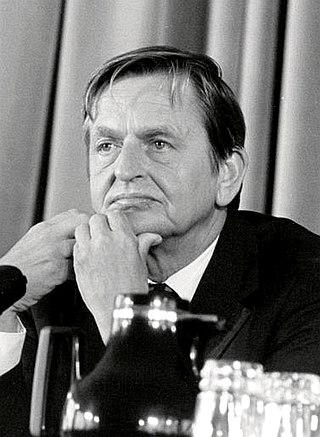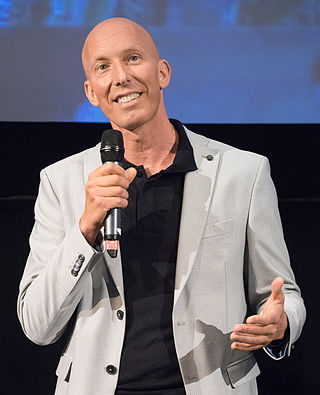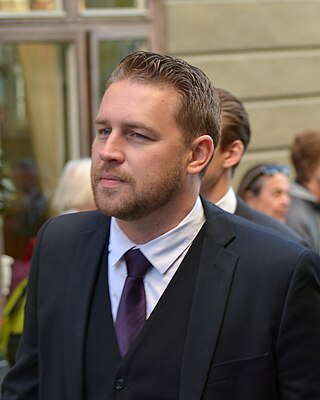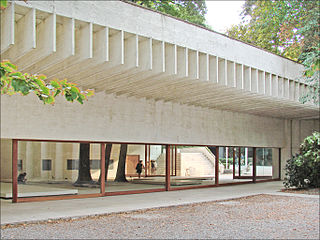Related Research Articles
Individualism is the moral stance, political philosophy, ideology, and social outlook that emphasizes the intrinsic worth of the individual. Individualists promote realizing one's goals and desires, valuing independence and self-reliance, and advocating that the interests of the individual should gain precedence over the state or a social group, while opposing external interference upon one's own interests by society or institutions such as the government. Individualism makes the individual its focus, and so starts "with the fundamental premise that the human individual is of primary importance in the struggle for liberation".

Sven Olof Joachim Palme was a Swedish politician and statesman who served as Prime Minister of Sweden from 1969 to 1976 and 1982 to 1986. Palme led the Swedish Social Democratic Party from 1969 until his assassination in 1986.

The Swedish Social Democratic Party, formally the SwedishSocial Democratic Workers' Party, usually referred to as The Social Democrats, is a social democratic and a democratic socialist political party in Sweden. Globally, it is a full member of the Progressive Alliance and the Party of European Socialists.
The Swedish People's Party of Finland is a Finnish political party founded in 1906. Its primary aim is to represent the interests of the minority Swedish-speaking population of Finland. The party is currently a participant in the Government of Petteri Orpo, holding the posts of Minister of Education, Minister for European Affairs, and Minister of Youth, Sport and Physical Activity.

John Fredrik Reinfeldt is a Swedish economist, lecturer, former Prime Minister of Sweden from 2006 to 2014 and chairman of the liberal conservative Moderate Party from 2003 to 2015. He was the last rotating President of the European Council in 2009. He is chairman of the Swedish Football Association since 25 March 2023.

Venstre, full name Venstre, Danmarks Liberale Parti, is a conservative-liberal, agrarian political party in Denmark. Founded as part of a peasants' movement against the landed aristocracy, today it espouses an economically liberal, pro-free-market ideology.

The Danish People's Party is a nationalist and right-wing populist political party in Denmark. It was formed in 1995 by former members of the Progress Party (FrP).
Liberal conservatism is a political ideology combining conservative policies with liberal stances, especially on economic issues but also on social and ethical matters, representing a brand of political conservatism strongly influenced by liberalism.
In general, liberalism in Europe is a political movement that supports a broad tradition of individual liberties and constitutionally-limited and democratically accountable government. These European derivatives of classical liberalism are found in centrist movements and parties as well as some parties on the centre-left and the centre-right.

Ivar Lo-Johansson was a Swedish writer of the proletarian school. His autobiographical 1978 memoir, Pubertet (Puberty), won the Nordic Council's Literature Prize in 1979.
A social welfare model is a system of social welfare provision and its accompanying value system. It usually involves social policies that affect the welfare of a country's citizens within the framework of a market or mixed economy.
Associationalism or associative democracy is a political movement in which "human welfare and liberty are both best served when as many of the affairs of a society as possible are managed by voluntary and democratically self-governing associations." Associationalism "gives priority to freedom in its scale of values, but it contends that such freedom can only be pursued effectively if individuals join with their fellows"

The Nordic model comprises the economic and social policies as well as typical cultural practices common in the Nordic countries. This includes a comprehensive welfare state and multi-level collective bargaining based on the economic foundations of social corporatism, and a commitment to private ownership within a market-based mixed economy – with Norway being a partial exception due to a large number of state-owned enterprises and state ownership in publicly listed firms.
The New Totalitarians is a 1971 book by British author Roland Huntford. Huntford analyzes the political and social climate of early 1970s Sweden, and argues that it resembles a benevolent totalitarian state in the mould of Aldous Huxley's Brave New World. The main thesis was that the Swedish government relied less upon the violence and intimidation of the old totalitarians than upon subtle persuasion and soft manipulation in order to achieve its goals. The influence of the state and official ideology were most visible in the most private of matters; where little or no consciously "political" control had stretched before.
Social democracy is a political, social, and economic philosophy within socialism that supports political and economic democracy and a gradualist, reformist and democratic approach towards achieving socialism. In modern practice, social democracy has become mainly capitalist, with the state regulating the economy in the form of welfare capitalism, economic interventionism, partial public ownership, a robust welfare state, policies promoting social equality, and a more equitable distribution of income.

Erik Walter Gandini is an Italian-Swedish film director, writer, producer and professor of documentary film at Stockholm University of the Arts.

Hans Kennert Mattias Hedarv Karlsson is a Swedish politician, writer and public commentator who served as Leader of the Sweden Democrats in the Riksdag from September 2014 to November 2019. He has been a Member of the Riksdag (SD) since October 2010. He previously served as Leader of the Sweden Democrats from 2014 to 2015. He currently heads the conservative think-tank Oikos. Since 2022, he has also served as the party's international outreach secretary. Karlsson has also been described as one of the SD's chief philosophical idealogues having been responsible much of the party's current platform and shift in its beliefs.

The Swedish Theory of Love is a 2015 Swedish documentary film directed by Erik Gandini.
Anarchism and libertarianism, as broad political ideologies with manifold historical and contemporary meanings, have contested definitions. Their adherents have a pluralistic and overlapping tradition that makes precise definition of the political ideology difficult or impossible, compounded by a lack of common features, differing priorities of subgroups, lack of academic acceptance, and contentious historical usage.

The Nordic Pavilion houses the national representation of the Nordic countries Sweden, Norway, and Finland during the Venice Biennale arts festivals.
References
- ↑ Berggren, Henrik & Trägårdh, Lars (2011). "Social trust and radical individualism: The paradox at the heart of Nordic capitalism" (PDF). The Nordic Way. Global Utmaning. pp. 13–27.
- ↑ Trägårdh, Lars (10 February 2012). "The Swedish model is the opposite of the big society, David Cameron". The Guardian . ISSN 0261-3077 . Retrieved 11 December 2016.
- ↑ Berggren, Henrik; Trägårdh, Lars (1 January 2015). Är svensken människa? gemenskap och oberoende i det moderna Sverige. Norstedts förl. OCLC 951454595.
- ↑ Ekman, Ivar (2006-11-13). "Like Garbo, Swedes just want to be alone - Europe - International Herald Tribune". The New York Times . ISSN 0362-4331 . Retrieved 11 December 2016.
- ↑ "'Sweden is a paradise but we've lost human values'". 29 December 2015. Retrieved 11 December 2016.